|
De Zuid-Afrikaanse schrijver André Brink werd geboren op 29 mei 1935 in Vrede. Zie ook alle tags voor André Brink op dit blog.
Uit: The blue door
“She is already in bed when I arrive, lying on her side, reading, her back turned to me, the outline of her body gracefully traced by the sheet, one smooth brown shoulder exposed.
But it is quite an obstacle course before I get there. First there is the bathroom. Automatically I go to the one where I bathed the children, but it is immediately evident that this is meant for the children only, or possibly for guests. Playing Blind Man’s Buff, I have to feel my way along the main passage where the lights have already been turned off, past the bedroom where the children have been tucked up for the night, towards a glimmer halfway to the left. From the passage door I can see another door leading from the bedroom, to my right, opposite the bed. To my great relief it turns out to be the en-suite bathroom. But this is by no means the end of my problems. I decide to spend a few minutes under the shower first: although I have already had a bath with the children, that was a rather hurried affair, and furthermore I need time to reflect on my immediate challenges. Which of the two toothbrushes – one blue, one red – am I supposed to use, which towel is mine? And afterwards, should I proceed to the bedroom naked, or with a towel around my waist, or wearing pyjamas? (Which will be where?)
In the end I decide not to aggravate the situation by wondering about what her expectations may be but simply to follow my inclination, doing what comes naturally to me.
So I am naked when I come into the bedroom and furtively slide in behind her back, trying to hide the evidence of my state of anticipation.
She glances over her shoulder and says, ‘Oh.’ Which may mean anything.
Fortunately there is a pile of books beside the lamp on what I take to be my bedside table, and I take the top one to page through. It is Jostein Gaarder’s Sophie’s World. I’ve been meaning to read it for a long time, but something has always intervened. Perhaps this is as good an opportunity as any of getting through it. But I soon put it down, all too aware of the gentle undulation of the woman’s body next to me.”
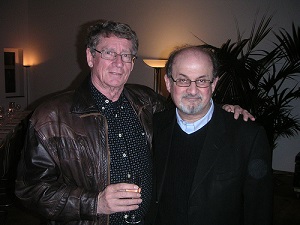
André Brink (Vrede, 29 mei 1935)
Hier met Salman Rushdie (rechts)
De Catalaanse dichter, schrijver en vertaler Eduard Escoffet werd geboren op 29 mei 1979 in Barcelona. Zie ook alle tags voor Eduard Escoffet op dit blog.
Each man is writing
each man is a frontier
each man is a shadow
each man is a door
each man is a failure
each man is a counter
each man is an outburst
each man is a rumour
each man is a wall
each man is a writing
each man is a silence
each man is shadow
each man is outburst
each man is din
each man is wall
each man is writing
each man is silence
Vertaald door Graham Thomson
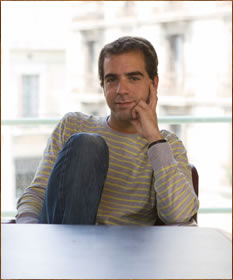
Eduard Escoffet (Barcelona, 29 mei 1979)
De Engelse letterkundige, schrijver en journalist Gilbert Keith Chesterton werd geboren in Londen op 29 mei 1874. Zie ook alle tags voor G. K. Chesterton op dit blog.
Uit: Father Brown. The Essential Tales (The Blue Cross)
“He alighted at Liverpool Street, however, quite conscientiously secure that he had not missed the criminal so far. He then went to Scotland Yard to regularise his position and arrange for help in case of need; he then lit another cigarette and went for a long stroll in the streets of London. As he was walking in the streets and squares beyond Victoria, he paused suddenly and stood. It was a quaint, quiet square, very typical of London, full of an accidental stillness. The tall, flat houses round looked at once prosperous and uninhabited; the square of shrubbery in the centre looked as deserted as a green Pacific islet. One of the four sides was much higher than the rest, like a dais; and the line of this side was broken by one of London's admirable accidents--a restaurant that looked as if it had strayed from Soho. It was an unreasonably attractive object, with dwarf plants in pots and long, striped blinds of lemon yellow and white. It stood specially high above the street, and in the usual patchwork way of London, a flight of steps from the street ran up to meet the front door almost as a fire-escape might run up to a first-floor window. Valentin stood and smoked in front of the yellow-white blinds and considered them long.
The most incredible thing about miracles is that they happen. A few clouds in heaven do come together into the staring shape of one human eye. A tree does stand up in the landscape of a doubtful journey in the exact and elaborate shape of a note of interrogation. I have seen both these things myself within the last few days. Nelson does die in the instant of victory; and a man named Williams does quite accidentally murder a man named Williamson; it sounds like a sort of infanticide. In short, there is in life an element of elfin coincidence which people reckoning on the prosaic may perpetually miss. As it has been well expressed in the paradox of Poe, wisdom should reckon on the unforeseen.”
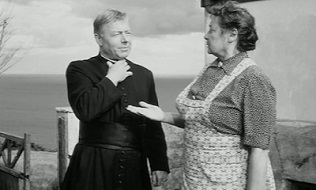
G. K. Chesterton (29 mei 1874 - 14 juli 1936)
Heinz Rühmann als Pater Brown in de film „Er kann's nicht lassen“, 1962
De Franse schrijver Bernard Charles Henri Clavel werd geboren op 29 mei 1923 in Lons-le-Saunier. Zie ook alle tags voor Bernard Clavel op dit blog.
Uit:Le seigneur du fleuve
“Philibert leva les yeux. Leurs regards se croisèrent. Il y eut, par-dessus la table où la lumière jouait à travers le vin secoué dans les verres, comme une étreinte. En même temps, ils éclatèrent tous les deux d’un grand rire.
Le vieux toussa, se pencha vers la gauche pour expédier dans l’âtre un long jet de salive qui chuinta sur les braises, puis, passant le revers de sa main sur sa bouche, il dit :
- Bon Dieu, c’est curieux comme les choses se font. je m’en viens du port. Je me force à marcher alors que j’ai envie de cavaler. Je marche. Et tout le long je me répète : cette espèce de morveux de Philibert, je m’en vais te lui sonner un branle, quelque chose de bien. Ce coup-ci, il s’en souviendra. Il a beau avoir quarante-cinq ans, il va m’entendre ! Tout le long, je me dis ça. Et j’arrive. Et je te vois tout bête. Et je vois ton verre vide, et je me dis : Il est comme toi, la colère lui sèche sa gorge. Et je veux tout de même te sonner le branle. Et je te regarde. Et je me dis encore : Félix, à son âge, tu étais comme lui. Aujourd’hui, tu as septante-deux ans, mais à quarante-cinq ans, tu aurais fait les mêmes conneries que lui.
Le vieux se tut. Il but une gorgée. Philibert qui le regardait se remit soudain à rire.”
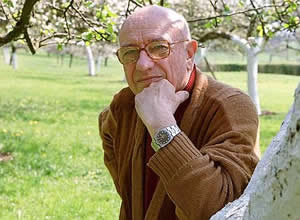
Bernard Clavel (29 mei 1923 – 5 oktober 2010)
De Hebreeuwse dichteres, schrijfster en letterkundige Leah Goldberg werd geboren in Königsberg (Pruisen) op 29 mei 1911. Zie ook alle tags voor Leah Goldberg op dit blog.
With This Night
With this night and with all of its hush
with this night —
with three stars
that were lost ‘twixt the trees
with that wind.
With that wind
that stood still so it might hear
this night —
with this night
and three stars
and that wind.
Vertaald door Annie Kantar
Song Without a Name
(He) would not believe that I don’t love a person
insulted, he would leave before understanding.
then I’ll go to my window and stare at the road
Accompanying the rest of my pain with no tear.
they walked as he did – without looking back.
since then I never saw them in my dreams
I could never believe that my heart will beat
in the pulse of their despair.
but while I am lonely, without a person
my hollow heart will be somewhat trembled
then I’ll bite my pale lip to bleeding
Never saying “come back”.
Vertaald door Lior Navok
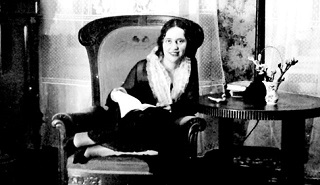
Leah Goldberg (29 mei 1911 – 15 januari 1970)
De Engelse dichter en schrijver Terence Hanbury White werd geboren op 29 mei 1906 in Bombay (Mombai). Zie ook alle tags voor T. H. White op dit blog.
Lost
Be kind, Helen, I am so tired of thinking;
There are so many difficult corridors of thought,
With equal iron banisters leading back again:
So many stone stairs, Helen, up which I sought
To rediscover the windy sky, and stand, blinking,
In the lost sunlight: as bright as pain,
Helen. I would give almost anything now
Even for pain. If one day down my iron avenues
The tubes and cubes, leading, at last, me right,
Should lose their remorseless patterns and diffuse
Into a kinder symmetry, and show me how
After a white hand pointing Exit, shine the stars at night:
Should I, appreciating the right gesture, fall dead?
I should walk out quietly and stand still
With the air in my hair and my feet in the wet dew,
Eternally motionless, without want, or will,
Not proud any more, Helen, of this poor head:
And I daresay even that's not true.
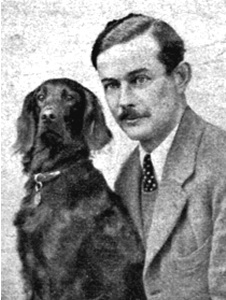
T. H. White (29 mei 1906 – 17 januari 1964)
Zie voor nog meer schrijvers van de 29e mei ook mijn blog van 29 mei 2011 deel 1 en eveneens deel 2.
|



